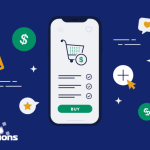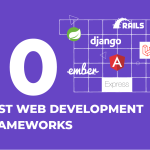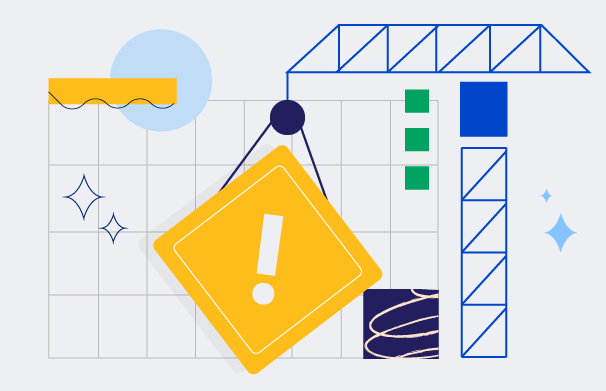Businesses have been adopting Internet of Things (IoT) technologies more actively, so the need for high-quality IoT platforms is also increasing.
In this article, we discuss the most popular Internet of Things platforms for 2024.
We build prototypes, PoCs, MVPs, and large scale IoT/embedded solutions for a wide range of industries.
IoT Technology Overview
Let’s briefly look at what the Internet of Things is.
The concept of the Internet of Things entails the establishment of distributed networks comprising numerous physical objects equipped with embedded software, sensors, and connectivity options. These objects collect data, sharing it with each other and with a central platform via the Internet.

The architecture of an IoT system comprises four layers.
- Sensors and actuators directly collect data from physical objects such as devices, equipment, machines, vehicles, home appliances, people, animals, and more.
- Gateways and data acquisition systems convert gathered data from analog to digital format.
- Edge computing ensures immediate preliminary data analytics directly on devices.
- Data centers or cloud services provide comprehensive data analysis, processing, and storage.
Examples of IoT systems
- Smart home systems such as security devices, intelligent lighting, conditioning, heating, and connected home appliances
- Wearable health devices such as pulse oximeters, glucose meters, and ECG monitors
- Logistics tracking systems such as GPS trackers, fuel level sensors, and alert systems for monitoring driver behavior
- Autonomous vehicles such as farming equipment, warehouse autonomous robots, and passenger buses
- Smart factory equipment such as robotics and predictive maintenance solutions
What Is an IoT Platform?
An IoT platform serves as a mediator between the world of physical objects and the world of actionable insights. By combining numerous tools and functionalities, Internet of Things platforms empower you to develop unique hardware and software products for gathering, storing, analyzing, and managing the abundance of data generated by your connected devices and assets.
Types of Internet of Things platforms
Connected products consist of numerous components, including:
- Hardware
- Software
- Communication technologies
- Central repository (cloud or local)
- End-user applications
To cover each aspect while developing a connected product, there are several types of IoT platforms.
- Hardware development platforms provide physical development boards for creating IoT devices, including microcontrollers, microprocessors, Systems on Chip (SoC), and Systems on Module (SoM).
- App development platforms serve as an integrated development environment (IDE) with tools and features for coding applications.
- Connectivity platforms provide communication technologies to connect physical objects with the data center (on-premises or cloud) and transmit information between them. Among popular connectivity protocols and standards for the Internet of Things are MQTT, DDS, AMQP, Bluetooth, ZigBee, Wi-Fi, Cellular, LoRaWAN, and more.
- Analytics platforms use intelligent algorithms to analyze collected data and transform it into actionable insights for customers.
End-to-end IoT platforms cover all aspects of connected products, from development and connectivity to data management and visualization.
The Importance of IoT Cloud Services
Cloud computing is the predominant technology of our time, empowering numerous businesses and technological sectors. The junction of the Internet of Things and cloud services unleashes the potential of IoT devices, opening new horizons for companies and customers alike.
- Firstly, the cloud offers unlimited scalability, a critical feature as the demand for handling and storing Big Data from thousands of devices continues to grow.
- Secondly, the cloud facilitates remote development and management, which is extremely convenient when connected assets are scattered across cities and countries.
Three types of cloud services are available for the Internet of Things development: Infrastructure-as-a-Service (IaaS), Platform-as-a-Service (PaaS), and Software-as-a-Service (SaaS).
Typically, Internet of Things cloud platforms are end-to-end solutions that combine capabilities such as app development, device management, connectivity management, data acquisition, and storage, as well as data analysis and visualization.
Most Popular IoT Platforms in 2024
To make it easier for you to decide which IoT platform to choose for your project, we’ve compiled a list of the most popular Internet of Things platforms with detailed descriptions: Amazon Web Services (AWS) IoT, Microsoft Azure IoT, Oracle IoT, Particle, IRI Voracity, ThingWorx, Google Cloud IoT, Cisco IoT Cloud Connect, Salesforce IoT Cloud, and IBM Watson IoT.
1. Amazon Web Services (AWS) IoT
One of the leading players on the cloud computing market, Amazon offers a wide range of cloud IoT services and solutions. The platform provides reliability and security for managing billions of industrial, commercial, consumer, and automotive devices.
AWS IoT services encompass software, management, and analytics.
Some examples
- FreeRTOS — a cloud-based, real-time operating system with a speedy and responsive kernel, over 40 architecture options, and a plethora of ready-to-use libraries.
- AWS IoT Core — a platform for simple and secure connection of devices to the cloud.
- AWS IoT Analytics — a fully managed service that allows users to collect, process, store, and analyze large volumes of data by providing built-in integration with other services, such as AWS IoT Core and Amazon S3.
Additionally, the company offers a variety of pre-built and customizable AWS IoT solutions tailored for different businesses, developed either by Amazon or its partners.
2. Microsoft Azure IoT
Another prominent cloud service provider, Microsoft, offers its Azure IoT platform, allowing customers to quickly build scalable and secure edge-to-cloud solutions for healthcare, discrete manufacturing, the energy sector, automotive, and other industries.
Products and services
- Azure IoT Operations — a suite of tools and services for managing and monitoring Internet of Things deployments. It enables organizations to efficiently oversee their devices, monitor their performance, troubleshoot issues, and optimize operations.
- Azure IoT Hub — a fully managed service that enables bidirectional communication between connected devices and the cloud. It facilitates secure and scalable connectivity, device management, and telemetry data ingestion for the Internet of Things solutions.
- Azure Digital Twins — a cloud service that enables the creation of digital representations, or models, of physical environments, assets, and processes. It allows organizations to visualize, simulate, and analyze real-world scenarios across various industries.
- Azure IoT Edge — a service that extends cloud capabilities to the edge of the network. It enables real-time processing of data locally on devices, reducing latency, bandwidth usage, and dependence on cloud connectivity.
- Azure Sphere — a comprehensive security solution that encompasses hardware, software, and cloud components to secure IoT devices end-to-end. It includes a secure microcontroller unit (MCU), a custom Linux-based operating system (OS), and cloud-based security services to protect connected devices from potential threats and vulnerabilities.
- Windows for IoT — a version of the Windows operating system designed specifically for the Internet of Things devices, enabling developers to build and deploy connected solutions using familiar Windows tools and technologies.
- Azure RTOS (aka ThreadX) — a comprehensive real-time operating system for embedded applications. It provides a reliable, scalable, and efficient platform for developing connected devices and IoT solutions, with features such as preemptive multitasking, real-time scheduling, and extensive middleware support.
3. Oracle IoT
The Internet of Things Cloud Service by Oracle is a managed Platform as a Service (PaaS) for connecting your devices to the cloud. It is widely used in logistics and smart manufacturing.
Core features
- The ability to create applications and connect them to devices, using JavaScript, Java, Android, iOS, C POSIX, and REST APIs
- Integration with enterprise applications, web services, and other Oracle Cloud Services
- Real-time analysis tools to aggregate and filter incoming data streams
- Automatic synchronization of data streams with Oracle Business Intelligence Cloud Service
- Unique digital identity for each device to establish trust relationships among devices and applications
4. Particle
Particle offers an edge-to-cloud platform for global connectivity and device management, as well as hardware solutions, including System-on-Modules, development boards, and gateways.
The platform prioritizes security throughout its products, implementing encryption, authentication, and access control measures to safeguard IoT devices and data from potential threats and vulnerabilities.
Among the key Particle use cases are industrial equipment monitoring, environmental monitoring, light electric vehicles, smart energy solutions, and HVAC systems.
5. IRI Voracity
If you need an all-in-one data management platform that enables Big Data control at every stage of your business processes, IRI Voracity is the perfect fit.
By leveraging two powerful engines, IRI CoSort and Hadoop, the platform efficiently handles structured, semi-structured, and unstructured data from IoT devices, accommodating diverse formats across Unix, Linux, and Windows file systems.
Core features
- IRI Data Manager Suite facilitates data integration, transformation, and migration tasks, streamlining the process of preparing IoT data for analysis and decision-making.
- IRI Data Protector Suite offers advanced security and privacy features, safeguarding sensitive IoT data against unauthorized access and breaches.
- In addition to its robust data management capabilities, IRI Voracity provides extensive support for business intelligence (BI) and analytics, empowering organizations to derive actionable insights from IoT solutions.
6. ThingWorx IIoT Platform
ThingWorx is a specialized industrial Internet of Things (IIoT) platform used in a variety of manufacturing and engineering scenarios. The platform addresses common challenges across industries, from remote monitoring and predictive maintenance to asset performance management and supply chain optimization.
With its powerful suite of tools and capabilities, ThingWorx enables organizations to seamlessly connect, manage, analyze, and optimize data from industrial equipment and processes. Leveraging advanced IoT technologies, including edge computing and machine learning, ThingWorx empowers businesses to unlock valuable insights, improve efficiency, and enhance decision-making across their operations.
7. Google Cloud IoT
Google, as a leading provider of cloud solutions, introduced its Cloud IoT Core service in 2017, catering to the demands of the ever-evolving Internet of Things market. This comprehensive platform allowed users to simplify data exchange between their cloud-based environments and connected devices. Additionally, the integration of IoT Core with other Google Cloud services ensured real-time data analysis and processing.
The platform automatically integrated with Internet of Things hardware producers such as Intel and Microchip. It supported various operating systems, including Debian Linux OS.
However, as of August 15, 2023, Google Cloud IoT Core is no longer available. Google has announced the retirement of this service, citing reasons such as its inability to comply with modern security standards, modernize the platform, and add new features.
Currently, the tech giant offers a variety of partner-driven solutions integrated with Google Cloud and tailored to meet the requirements of IoT clients.
8. Cisco IoT Cloud Connect
Cisco IoT Cloud Connect was originally an offering for mobile operators. This cloud-based software suite for industrial and individual use cases was regularly on the list of the best Internet of Things cloud platforms. Cisco also provided reliable IoT hardware, including switches, access points, routers, gateways, and more.
Currently, Cisco IoT Cloud Connect is not supported.
However, Cisco offers a range of industrial Internet of Things solutions for:
- Network connectivity (industrial switches, routers, embedded networking, etc.)
- Cybersecurity (Cisco Cyber Vision, Cisco Secure Equipment Access (SEA), Cisco Secure Firewall, and more)
- Edge computing (Cisco IOx)
- Data control and exchange (Cisco Edge Intelligence that integrates with AWS IoT Core)
- IoT management and automation
9. Salesforce IoT Cloud
Salesforce specializes in customer relations management and masterfully enhances this segment with the help of IoT solutions.
The Salesforce IoT Cloud platform gathers valuable information from connected devices to deliver personalized experiences to and build stronger relationships with your customers. It works in tandem with Salesforce CRM: data from connected assets is delivered directly to the CRM system where context-based actions are initiated immediately.
For example, if sensors detect an error in windmill performance, it is instantly reflected in the CRM dashboard and the system can either adjust parameters automatically or create a service ticket.
Core features
- Full integration of customers, products, and CRM
- No need for programming skills to create rules, conditions, and events due to a simple point-and-click UI
- Compatibility with third-party websites, services, and other products
- A proactive approach to customer issues and needs
10. IBM Watson IoT
An IoT platform built on IBM Cloud is a fully managed cloud service for device management, flexible and scalable connectivity options, secure communications, and data lifecycle management. With IBM Watson IoT, you can collect insights from automobiles, buildings, equipment, assets, and things.
Core features
- Data ingestion from any source with the help of MQTT
- Direct access to the latest data in the Cloudant NoSQL DB solution
- Built-in monitoring dashboards to control your assets
- Analytics Service to process raw metrics
- The Cloud Object Storage solution for long-term data archiving
How to Choose the Best IoT Platform
There’s no definite answer to this question since there’s no one best platform suitable for any digital project. The choice will always depend on the specific requirements of your business.
Large enterprises are more likely to turn to giants such as Amazon or Microsoft. Their offerings are the best established, but also the most expensive. Smaller companies may find more cost-efficient options that will nevertheless perfectly meet their requirements.
When choosing a provider, you should consider the technical capabilities of a platform, its partner ecosystem, industry-specific features and, in general, the provider’s reputation. All these parameters should comply with your company strategy and budget.
If you need help selecting a platform, contact SaM Solutions’ specialists. Our development teams have experience in building IoT applications and devices and can advise you on all related issues. We know the pros and cons of various platforms, and will easily be able to recommend the right option for your digital strategy.



























 5 Reasons Why Your Business Needs a Mobile eCommerce Application
5 Reasons Why Your Business Needs a Mobile eCommerce Application Using Salesforce to Improve Your Sales Pipeline: Five Tips
Using Salesforce to Improve Your Sales Pipeline: Five Tips Cross-Platform Mobile Development: Five Best Frameworks
Cross-Platform Mobile Development: Five Best Frameworks How to Develop Custom Accounting Software
How to Develop Custom Accounting Software 10 Best Web Development Frameworks in 2024
10 Best Web Development Frameworks in 2024












